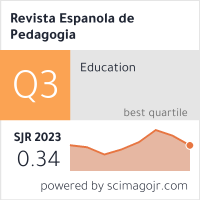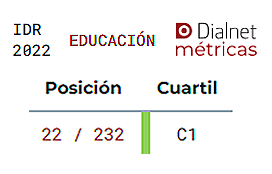Leadership for the negentropic online enterprise
Resumen
Este artículo trata el fenómeno opuesto a la degradación entrópica, tal como se entiende en las ciencias físicas y lo aplica, de manera metafórica, a las empresas online. Las conductas neguentrópicas son aquellas que aportan reintegración, renovación y, finalmente, estados positivos a la organización. El aprendizaje online, que ha resultado ser un pilar básico de los planes estratégicos de la mayoría de universidades e institutos, tiene el potencial para un gran impacto neguentrópico en los centros de educación superior dentro de instituciones individuales. En este artículo nos centramos, fundamentalmente, en cómo la aplicación de la neguentropía contribuye al liderazgo de las empresas online, a la espera de que la tendencia positiva se traslade a los centros de educación superior.
Cómo citar este artículo: Carr-Chellman, A., Freeman Jr., S. y Kitchel, A. (2019). Liderazgo en la empresa online neguentrópica | Leadership for the negentropic online enterprise. Revista Española de Pedagogía, 77 (274), 437-454. doi: 10.22550/REP77-3-2019-08
Referencias | References
Austin, A. (1990). Faculty cultures, faculty values. New Directions in Institutional Research 1990, 68, 61-74.
Bridgman, P. W. (1941). The nature of thermodynamics. Boston, MA: Harvard University Press.
Brillouin, L. (1953). The Negentropy Principle of Information. Journal of Applied Physics, 24, 1152-1163.
Brillouin, L. (1956). Science and information theory. New York: Academic Press.
Brillouin, L. (1962). Science and information theory. Oxford: Academic Press.
Brownell, S. y Tanner, K. (2012). Barriers to faculty pedagogical change: Lack of training, time, incentives, and …tensions with professional identity. CBE-Life Sciences Education, 11 (4),339-346.
Carnot, S. (1824). Reflexions sur la puissance motrice du feu et sur les machines propres a developer cette puissance. Paris: Bachelier.
Carr-Chellman, A., Beabout, B., Alkandari, K., Almeida, L., Gursoy, H., Ma, Z., … Pastore, R. (2008). Change in chaos: Seven lessons learned from Katrina. Educational Horizons, 87 (1), 26-39.
Cavanaugh, J. C. (2018). Higher education in the postdegree era. Inside Higher Ed. Recuperado de https://www.insidehighered.com/views/2018/06/04/how-higher-ed-has-change-remain-relevant-future-opinion (Consultado el 17-07- 2019).
Craig, R. (2017). The top 10 higher education issues we all agree on. Forbes. Recuperado de https://www.forbes.com/sites/ryancraig/2017/01/20/thetop-10-higher-education-issues-we-all-agreeon/#30e6fbaffa87 (Consultado el 15-06-2019).
Dhir, K. (19 de enero de 2015). On being a dean: The challenge of academic leadership. Fundamatics. Recuperado de http://www.fundamatics.net/article/on-being-a-dean-the-challenge-of-academic-leadershi/ (Consultado el 15-06-2019).
Donaldson, S. (4 de enero de 2011). Entropy is not disorder [Mensaje en un blog]. Retrieved from http://www.science20.com/train_thought/blog/entropy_not_disorder-75081 (Consultado el 15-06-2019).
Doucette, D. (2018). Colleges tackle the retention problem with emerging tech. Ed Tech. Recuperado de https://edtechmagazine.com/higher/article/2018/05/colleges-tackle-retention-problem-emerging-tech (Consultado el 17-07-2019).
Douglas-Gabriel, D. (26 de octubre de 2016). College costs rising faster than financial aid, report says. The Washington Post. Recuperado de https://www.washingtonpost.com/news/grade-point/wp/2016/10/26/college-costs-rising-faster-than-financial-aid-report-says/?utm_term=.9a70fdff6730 (Consultado el 15-06-2019).
Dumestre, M. J. (2016). Financial Sustainability in US Higher Education: Transformational Strategy in Troubled Times. New York, NY: Palgrave Macmillan.
Farber, M. (19 de diciembre de 2016). College enrollment dips as more adults ditch degrees for jobs. Fortune. Retrieved from https://fortune.com/2016/12/19/college-enrollment-decline/ (Consultado el 16-07-2019).
Finney, J. E. (2016). Why the finance model for public higher education is broken and must be fixed. Penn Wharton Public Policy Initiative Issue Brief, 2 (6). Recuperado de https://publicpolicy.wharton.upenn.edu/issue-brief/v2n6.php (Consultado el 15-06-2019).
Fischer, K. (4 de marzo de 2013). The employment mismatch. The Chronicle of Higher Education. Recuperado de http://www.chronicle.com/article/The-Employment-Mismatch/137625 (Consultado el 15-06-2019).
Fjortof, N. (1993). Factors predicting faculty commitment to the university. Paper presented at the Thirty-third Annual AIR Forum, Chicago, IL.
Freeman Jr., S. y Diramio, D. (2016). Elitism or pragmatism? Faculty hiring at top ranked in higher education administration. Journal of the Professoriate, 8 (2), 94-127.
Freeman Jr., S., Kitchel, A. y Carr-Chellman, A. (2017). The negentropic professor and the online curriculum. ELearn Magazine, 11. doi: 10.1145/3168360.3152716
Freeman Jr., S., Carr-Chellman, A. y Kitchel, A. (2018). The Negentropic University: A Commentary. Teachers College Record. Recuperado de http://www.tcrecord.org/Content.asp?ContentId=22389 (Consultado el 18-07-2019).
Friedman, J. (9 de febrero de 2016). Study: Enrollment in online learning up, except at for-profits. U.S. News and World Report. Recuperado de https://www.usnews.com/education/online-education/articles/2016-02-09/study-enrollment-in-online-learning-up-except-at-forprofits (Consultado el 19-07-2019).
Friedman, J. (3 de mayo de 2017). Study: Online course enrollment rising rapidly at private nonprofits. U.S. News and World Report. Recuperado de https://www.usnews.com/higher-education/online-education/articles/2017-05-03/study-online-learning-enrollment-rising-fastest-at-private-nonprofit-schools (Consultado el 19-07-2019).
González, K. P. (1999). Faculty commitment and engagement in organizational reform. Paper presented at Annual Meeting of the Association for the Study of Higher Education, San Antonio, TX.
Harshbarger, B. (1989). Faculty commitment to the university: influences and issues. Review of Higher Education, 13, 29-45.
Hearn, J. C. (2006). Student success: What research suggests for policy and practice. Paper presented at the National symposium on Postsecondary Student Success. Recuperado de https://wces.ed.gov/npec/pdf/synth_Hearn.pdf
Heckman, P. E., y Montera, V. L. (2009). School reform: The flatworm in a flat world: From entropy to renewal through indigenous invention. Teachers College Record, 111 (5), 1328-1351.
Henly, S. J. (2016). Science publishing, social media, and nursing research on Facebook and Twitter. Nursing Research, 65 (3), 169.
Ho, M. (1994). What is (Schrödinger's) negentropy? Modern Trends in BioThermoKinetics, 3, 50-61. Retrieved from https://ratical.org/co-globalize/MaeWanHo/negentr.html (Consultado el 15-06-2019).
Hurn, J. L. (2006). An analysis of the effects of online practice quizzes on the achievement, self-efficacy, and academic motivation of college algebra students at a community college (Tesis doctoral inédita). Kansas State University, Manhattan, Kansas, EE.UU.
Iannone, R. (1995). Chaos theory and its implications for curriculum and teaching. Education, 115 (4), 541. Retreived from https://www.questia.com/library/journal/1G1-17422890/chaostheory-and-its-implications-for-curriculumand (Consultado el 17-07-2019).
Jovanovic, S. (2017). Speaking back to the neoliberal agenda for higher education. Cultural Studies ↔ Critical Methodologies, 17 (4), 327-332.
Kiel, L. y Elliott, E. (2009). Chaos theory in the social sciences: foundations and applications. Ann Arbor: University of Michigan Press.
Kislik, L. (20 de Noviembre de 2017). What to do if your boss gets distracted by every new thing. Harvard Business Review. Recuperado de https://hbr.org/2017/11/what-to-do-if-your-bossgets-distracted-by-every-new-thing (Consultado el 17-07-2019).
Kuh, G. D., Kinzie, J., Schuh, J. H. y Whitt, E. J. (2005). Student Success in College: Creating Conditions That Matter. San Francisco: Jossey-Bass.
Lee, J. y Rhoads, R. (2004). Faculty entrepreneurialism and the challenge to under-graduate education at research universities. Research in Higher Education, 45 (7), 739-758.
Lester, J. y Kezar, A. (2012). The formation and strategies of grassroots leadership teams. Innovative Higher Education, 37 (2), 105-124.
Lucas, J. (22 de mayo de 2015). What is the Second Law of Thermodynamics? Live Science. Recuperado de https://www.livescience.com/50941-second-law-thermodynamics.html (Consultado el 15-06-2019).
Luhmann, N. (1996). Social systems. Palo Alto, CA: Stanford University Press.
Mavrofides, T. , Kameas, A. , Papageorgiou, D. y Los, A. (2011). On the Entropy of Social Systems: A Revision of the Concepts of Entropy and Energy in the Social Context. Systems Research and Behavioral Science, 4 (28), 353-368. doi: 10.1002/sres.1084
Miller, J. G. (1978). Living Systems. New York: Mc-Graw-Hill. Nanbin, X. (2011). The system control and organization decision-making of university management based on entropy theory. Management y engineering, 4, 100-104.
Neumann, Y., Finaly-Neumann, E. y Reichel, A. (1991). Determinants and correlates of faculty burn_out in U.S. research universities. The Journal of Higher Education, 61 (1), 20-31.
O'Meara, K., Chalk-Bennett, J. y Neihaus, E. (2016). Left unsaid: The role of work expectations and psychological contracts in faculty careers and departure. The Review of Higher Education, 39 (2), 269-297.
Palin, A. (2014). Universities protective of their brands. Financial Times. Recuperado de https://www.ft.com/content/88f58068-9979-11e3-b3a2-00144feab7de (Consultado el 17-07-2019).
Romano, C. y Connell, J. F. (2015). Faculty's role in retention: A case study of change management at Ramapo College. Strategic Enrollment Mgmt Quarterly, 3, 184-201.
Sankey, M. D. y Whitsed, R. (2016). Failing Forward in Research around Technology Enhanced Learning. Trabajo presentado en la 33 International Conference of Innovation, Practice and Research in the Use of Educational Technologies in Tertiary Education, University of South Australia, Adelaide, Australia.
Schrodinger, E. (1944). What is life? The physical aspect of the living cell. Cambridge, UK: Cambridge University Press.
Scrimali, T. (2008). Entropy of Mind and Negative Entropy: A Cognitive and Complex Approach to Schizophrenia and its Therapy. London, England: Karnac Books.
Sibley, K. y Whitaker, R. (16 de marzo de 2015). Engaging faculty in online education. Educause Review. Recuperado de https://er.educause.edu/articles/2015/3/engaging-faculty-in-online-education (Consultado el 16-07-2019).
Staley, D. y Trinkle, D. (7 de febrero de 2011). The changing landscape of higher education. Educause Review. Recuperado de https://er.educause.edu/articles/2011/2/the-changing-landscape-of-higher-education (Consultado el 17-07-2019).
Von Bertalanffy, L. (2015). General System Theory: Foundations, Development, Applications. New York, NY: George Braziller Inc.
Wheeler, D. (2012). Servant Leadership for Higher Education: Principles and Practices. Hoboken, NJ: Jossey-Bass.
Whitaker, M. (2 de enero de 2018). The 21st-Century Academic. Chronicle of Higher Education. Recuperado de https://www.chronicle.com/article/The-21st-Century-Academic/242136 (Consultado el 15-06-2019).
Wright, T. y Horst, N. (2013). Exploring the ambiguity: what faculty leaders really think of sustainability in higher education. International Journal of Sustainability in Higher Education, 14 (2), 209-227. doi: 10.1108/14676371311312905
Zawacki-Richter, O. (2005). Online Faculty Support and Education Innovation – A Case Study. European Journal of Open and Distance Learning (EURODL), 1 (1). Recuperado de http://www.eurodl.org/materials/contrib/2005/Zawacki_Richter.htm
Citación recomendada | Recommended citation
Carr-Chellman, A.,
Jr., S. F.,
&
Kitchel, A.
(2019)
.
Liderazgo en la empresa online neguentrópica.
Revista Española de Pedagogía, 77(274).
https://www.revistadepedagogia.org/rep/vol77/iss274/3
Licencia Creative Commons | Creative Commons License
Esta obra está bajo una licencia internacional Creative Commons Atribución-NoComercial 4.0.
This work is licensed under a Creative Commons Attribution-NonCommercial 4.0 International License









